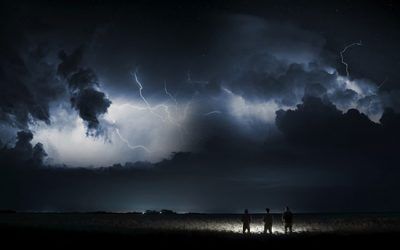The “Great Controversy” is the phrase Seventh-day Adventists typically use to describe the cosmic spiritual conflict between the forces of good (God) and the forces of evil or sin (Satan/the devil).
It’s the reason our world has both bad and good in it at the same time, constantly opposing one another.
This is a key doctrine for the Seventh-day Adventist Church when it comes to framing and interpreting Scripture. Here’s how it’s described in our Fundamental Beliefs:
“All humanity is now involved in a great controversy between Christ and Satan regarding the character of God, His law, and His sovereignty over the universe.
This conflict originated in heaven when a created being, endowed with freedom of choice, in self-exaltation became Satan, God’s adversary, and led into rebellion a portion of the angels.
He introduced the spirit of rebellion into this world when he led Adam and Eve into sin. This human sin resulted in the distortion of the image of God in humanity, the disordering of the created world, and its eventual devastation at the time of the global flood, as presented in the historical account of Genesis 1-11.
Observed by the whole creation, this world became the arena of the universal conflict, out of which the God of love will ultimately be vindicated. To assist His people in this controversy, Christ sends the Holy Spirit and the loyal angels to guide, protect, and sustain them in the way of salvation.”
So this all-encompassing spiritual battle is what’s behind everything wrong in our world. We are experiencing both sides of the dichotomy of good and evil, love and sin, selfishness and unselfishness. And it’s up to us to daily decide how we proceed in a world where we “know both good and evil”—all mixed together (Genesis 3:1-7, 22-24).
But why does it all have to happen this way? And how should we respond to the reality of the conflict we’re living in?
Let’s break this down.
We’ll go over:
- What is happening in this conflict between God and Satan
- How it all began
- How it ended up on earth
- Why God didn’t destroy Satan at the beginning
- How the Great Controversy will end
- What we can learn about the Great Controversy from Jesus’ ministry
- Why sin is still part of life, even though Jesus already died on the Cross
- Whether we should be afraid of Satan
First, let’s get a general idea of what’s been happening in this conflict throughout history—and still today.
What is happening in this Great Controversy between God and Satan?
Photo by Pixabay
As we live out each day, we are confronted with an array of choices.
Some are neutral or of little consequence, like which cereal to eat for breakfast. We hardly even register these types of things as “decisions.”
But we definitely feel the weight of the bigger choices that rely on our morality. Do we cheat on our taxes if we can easily get away with it? How should we treat a needy family member with boundary issues? How should we respond to a rude remark from a supervisor at work? Should we report a crime we witnessed, even if it was committed by a good friend?
And the worst part of some of these decisions is that sometimes there doesn’t seem to be a “right” answer. There’s always a trade-off, always several cons to the pros, always a risk that things could get worse no matter what you do.
But this constant push-and-pull we feel in our consciences has to do with living in a world where both good and evil exist together, all tangled up.
And behind the scenes, two opposing forces want to influence our choices.
God wants to guide us. Satan wants to deceive us.
God will always accept us and provide us with truth. But He will never force us to follow His guidance. Love can’t happen through force.
But Satan takes advantage of this situation and entices us into self-serving decisions and behaviors that ultimately lead us toward destruction.
What a mess.
That’s probably why, even apart from religion and spirituality, there are countless stories, theories, epics, sagas, and myths about the constant struggle of good vs. evil. No matter what people call the good or name the evil, it’s obvious that the struggle is real.
A battle that started long ago, in another part of Creation, is now being played out here on earth because God created us as beings of free agency—the ability to choose for ourselves.
Some say these battles arise from natural and historical forces, or the outworking of various human political, economic, and social powers as they progress. Others see it as the continuation of the process of evolution as life fights it out for existence.
And some see the struggle between good and evil as purely psychological. They see it as the inner conflict that arises from the human psyche, which is then played out in the drama of human existence.
One way or another, we all acknowledge that opposing moral forces are at play.
That could be why the poet T.S. Eliot wrote:
“The world turns and the world changes,
But one thing does not change.
In all of my years, one thing does not change.
However you disguise it, this thing does not change:
The perpetual struggle of Good and Evil.”1
Even a staunch atheist like German Frederick Nietzsche noticed this:
“Let us conclude. The two opposing values ‘good and bad,’ ‘good and evil’ have been engaged in a fearful struggle on earth for thousands of years; and though the latter value has certainly been on top for a long time, there are still places where the struggle is as yet undecided.”2
And the Bible has much to say about the sin-saturated reality we live in.
The apostle Paul describes the frustration of wanting to do all the right things and follow the Law of God to the letter but lacking the willpower to consistently do so.
“For I do not understand what I am doing, because I do not practice what I want to do, but I do what I hate. … When I want to do good, evil is present with me. For in my inner self I delight in God’s law, but I see a different law in the parts of my body, waging war against the law of my mind and taking me prisoner to the law of sin” (Romans 7:15, 21-23, CSB).
Paul also emphasizes the fact that this isn’t a battle of strength or resolve. We’re in the middle of a war between spiritual forces. That’s why we need spiritual assistance from God.
“For we do not wrestle against flesh and blood, but against principalities, against powers, against the rulers of the darkness of this age, against spiritual hosts of wickedness in the heavenly places” (Ephesians 6:12, NKJV).
“Be sober-minded, be alert. Your adversary the devil is prowling around like a roaring lion, looking for anyone he can devour. Resist him, firm in the faith, knowing that the same kind of sufferings are being experienced by your fellow believers throughout the world” (1 Peter 5:8-9, CSB).
All of these descriptions seem quite grim. But even as we continue to go through these details about the Great Controversy theme, remember that God is on our side. He wants us to prevail against the spiritual forces of Satan that have no regard for our well-being. That’s why He offers us so many promises throughout Scripture and asks that we pray continually so we can indeed resist the efforts of Satan and stand “firm in the faith.”
Now let’s look back to how things became this way.
Where did the Great Controversy begin?
The Great Controversy between Jesus Christ and Satan began in heaven.
John described the beginning of this battle in the book of Revelation when he said:
“And war broke out in heaven: Michael and his angels fought with the dragon; and the dragon and his angels fought” (Revelation 12:7, NKJV).
War in heaven between cosmic entities?
Yes, the Bible teaches that life on this earth is not the only life in the universe. For instance, the apostle Paul talked about other, non-earthly intelligences:
“To the intent that now the manifold wisdom of God might be made known by the church to the principalities and powers in the heavenly places” (Ephesians 3:10, NKJV).
(Other verses that talk about the reality of other life in the universe include: 1 Corinthians 4:9; Matthew 18:10; Colossians 1:16,17; Job 1:6, 7; 38:7).
And all this life—not only on Earth but throughout the universe—was created by a loving God. But why is it important for us to know that God is a God of love?
Because understanding God’s love is key to understanding God Himself, humanity, and the birth of this very controversy.3
Love is the overarching principle of how God relates to His creation. This is seen in the famous verse, John 3:16:
“For God so loved the world that He gave His only begotten son” (NKJV).
And as a direct result of His love, He created all His intelligent creatures with the ability to love as well.
But for love to be true love, it cannot be forced. It must be freely given. So, this moral freedom we have is a basic principle God gifted to all intelligent creatures, whether in heaven or on Earth.
Adventist scholar Frank Holbrook wrote:
“God created all intelligent beings as free moral agents with the ability to render loving allegiance to the Creator or to reject His authority.”4
The Bible recounts the first unfortunate abuse of this freedom by an angel called Lucifer. Perhaps the most revealing text of Lucifer is found in the Old Testament book of Ezekiel:
“You were the anointed cherub who covers; I established you; you were on the holy mountain of God; you walked back and forth in the midst of fiery stones. You were perfect in your ways from the day you were created, till iniquity was found in you” (Ezekiel 28:14, NKJV).
This was a heavenly being, an angel created by God. And he was perfect. God wouldn’t create something that wasn’t perfect.
But this perfection didn’t last. Lucifer, or Satan as he was later named, was only perfect until “iniquity,” or a character that became bent toward sinfulness,5 was found in him.
A perfect being, created by a perfect God, in a perfect heaven? Why would iniquity be found in him?
It all comes back to love and the freedom God gives us in love.
Lucifer as a perfect being also had to be a free being, a being capable of love. Being perfect requires being free. So since he was free, that freedom allowed him to have the capacity to harbor thoughts that led to his rebellion against God.
C.S. Lewis describes why this type of freedom is essential:
“If a thing is free to be good, it is also free to be bad. And free will is what has made evil possible.
Why, then, did God give them free will? Because free will, though it makes evil possible, is also the only thing that makes possible any love or goodness or joy worth having.
A world of automata—of creatures that worked like machines—would hardly be worth creating. The happiness which God designs for His higher creatures is the happiness of being freely, voluntarily united to Him and to each other in an ecstasy of love and delight compared with which the most rapturous love between a man and a woman on this earth is mere milk and water. And for that they must be free.”6
Using this freedom, Lucifer became unsatisfied with his exalted position as the covering cherub, and he wanted more. So he challenged God’s position, and he hasn’t let up on this challenge, even to this day. He’s dug in his heels, and he’s not giving up.
In the poetic imagery of earthly monarchs, the Bible tells us what happened with Lucifer in heaven and how he rebelled:
“Your heart was lifted up because of your beauty; you corrupted your wisdom for the sake of your splendor” (Ezekiel 28:17, NKJV).
It also says this about Lucifer:
“For you have said in your heart: ‘I will ascend into heaven, I will exalt my throne above the stars of God; I will also sit on the mount of the congregation on the farthest sides of the north; I will ascend above the heights of the clouds, I will be like the Most High”’ (Isaiah 14:13, 14, NKJV).
Somehow, amid the recesses of his mind, Lucifer aspired to be God Himself. And as that thought overtook him, so began the story of sin and the Great Controversy.
If the Great Controversy started in heaven, how did it end up on earth?
Photo by Georgia de Lotz on Unsplash
This epic conflict shifted to earth because humanity was also free to choose their actions and allegiances. As Satan represented opposition to God, he tempted Adam and Eve in the Garden of Eden with the “knowledge of good and evil,” and they gave in (Genesis 3).
Revelation 12:7-9 tells about how Satan first landed on earth after his rebellion in heaven.
“And war broke out in heaven: Michael and His angels fought with the dragon; and the dragon and his angels fought, but they did not prevail, nor was a place found for them in heaven any longer. So the great dragon was cast out, that serpent of old, called the Devil and Satan, who deceives the whole world; he was cast to the earth, and his angels were cast out with him” (NKJV).
Then, Genesis 3 tells the story of how Adam and Eve, created like the angels as free moral agents, used that freedom for their own selfish interests at the instigation of Satan (see also Revelation 12:9; 20:2-3).
And just as Lucifer in heaven fell because he wanted to be like God, he used what happened to him in heaven to tempt and deceive the first humans on Earth.
He told Eve that if she ate of the forbidden tree, she would be like God, knowing good and evil (Genesis 2:17; 3:5).
What makes this extra sad is that Adam and Eve were already made “in the image of God” (Genesis 1:27, CSB).
So, in a way, they already were like God.
But we’re told Satan was “crafty,” even opting to take the form of a beautiful, radiant serpent (very much unlike the snakes of today). But his behavior was certainly snake-like. He mixed truth with error—the kind of lies that are easiest to fall for.
He started by misquoting God’s command, knowing Eve would be able to correct him (compare Genesis 2:16-18 to Genesis 3:1-3).
So he made the first humans think that they had control of the conversation.
Then he told them part of what would “really” happen if they ate from the forbidden tree. He promised that if they ate the fruit, they would be “like God” in a very specific way—in “knowing good and evil” (Genesis 3:4-5, CSB).
And this was the actual consequence and the very name of the tree. So he wasn’t even lying about that part. He didn’t have to.
Adam and Eve were likely taken in by the novelty of it all. Nothing like this had happened to them before. And they hadn’t experienced this “evil” being talked about now.
Add to that the temptation to “be like God,” which was also a new and enticing thought.
And with these few pieces of dialogue expressed in a carefully planned-out way, Satan planted doubt in the minds of the first humans. He insinuated that God was actually being selfish, untrustworthy, and holding something back from the humans He claimed to love.
So here we see that the Great Controversy began first in heaven with Lucifer, but he brought this rebellion to earth after he was banished from heaven and renamed “Satan.”
Why didn’t God destroy Satan as soon as he rebelled?
An analogy could help answer this fair question.
Suppose you were a kind and loving leader of a country. For some unfair and unjust reason, someone started a rebellion and accused you of being cruel, unfair, and unjust.
What if you responded to these charges by simply wiping out the rebels?
Yes, you might have ended the rebellion, but what about the charges made against you?
By killing the rebels, you would have just validated their accusations. You could then be called cruel, unfair, and unjust.
But as we have seen, Scripture teaches that God is a God of love, and He does not force His creation to follow Him.
Instead, in fairness, God is allowing the principles of Satan and rebellion to play out before the eyes of the universe (Ephesians 3:10; 1 Corinthians 4:9; Revelation 15:3).
That way, we will truly know what happens if we choose the other path. No one could say so, otherwise.
How will the Great Controversy be resolved?
Photo by Alicia Quan on Unsplash
Adventists believe the central component of the Great Controversy is the life and ministry of Jesus, and its climax was at the Cross.
When Jesus was brutally put to death while remaining completely innocent, the fate of sin was decided once and for all.
Let’s go back to the analogy of the leader who was accused by rebels of being cruel, unjust, and unfair.
What if, in order to answer the charges, this leader voluntarily came down to the level of all his people? What if he lived among them, suffered among them, and even sacrificed his life for them?
What would that say about the charges against him?
It would negate them.
And what if the one who accused the leader of being cruel was the one who unjustly killed him? Wouldn’t that make the rebel the unjust one instead?
Though only an analogy, this reveals how Jesus answered the charges Satan made against Him.
How do we see the Great Controversy in the ministry of Jesus?
The battle between Christ and Satan is revealed in the life and death of Jesus.
As an example, we see that right after His baptism, the Great Controversy was on display when Satan tempted Jesus in the wilderness (Matthew 3:13-17; 4:1-11).
Satan, who is a supernatural being, tried to tempt Jesus three times. Satan tried to get Jesus to doubt who He was, appeal to His earthly needs, and be diverted from His mission.
But all three times, Christ defeated Satan, which was a precursor to Satan’s final defeat at the end of time (Revelation 20:10).
All through His ministry on Earth, Jesus often referred to Satan—or confronted and defeated satanic forces—in the context of the Great Controversy (Matthew 12:26; Mark 4:15; Luke 10:18; 22:3, 31).
One time, when Jesus came across a man possessed by demons, the demons cried out:
“What have we to do with You, Jesus, You Son of God? Have You come here to torment us before the time?” (Matthew 8:29, NKJV).
Clearly, they understood they were no match for Jesus.
Then, the book of Acts talks about “how God anointed Jesus of Nazareth with the Holy Spirit and with power, who went about doing good and healing all who were oppressed by the devil, for God was with Him” (Acts 10:38, NKJV).
Just before the Cross, Jesus said that His own death would lead to the conquest of Satan.
“Now is the judgment of this world; now the ruler of this world [Satan] will be cast out” (John 12:31, NKJV).
It’s at the Cross that Satan was defeated once and for all. He was also exposed before the universe for what he really was:
“At the cross, Satan (including the other fallen angels) was clearly seen in his true light as a rebel and a murderer. We may infer that any link of sympathy still existing in the minds of the heavenly beings for Satan’s cause was forever broken.”7
If Satan was defeated at the Cross, why is there still sin today?
Photo by Kindel Media
Even with the defeat of Satan at the Cross, which ensured his final destruction, humanity’s story is still playing out. There is more to demonstrate about the character of God, and our collective redemption is not yet complete.
Our freedom of choice is still in the picture. And cutting this conflict short would hinder us all from being redeemed, or even redeemable.
Ephesians 3:10 states that “now the manifold wisdom of God might be made known by the church to the principalities and powers in the heavenly places” (NKJV).
Because of Satan’s initial rebellion, other heavenly beings could still be harboring doubt about the character of God. And human beings as well. So to put an end to that doubt, everyone must see the end of sin and the wisdom and victory of God from the perspective of humanity.
To put it simply, we still have our choices to make. Even after knowing about Jesus’ ministry on earth, we still are able to make the ultimate choice of where we place our allegiance. In God, our Creator? Or somewhere else?
At the end of time, after God’s judgments are issued, heavenly beings cry out:
“Even so, Lord God Almighty, true and righteous are Your judgments” (Revelation 16:7; 19:2, NKJV)
So, even after the Cross, there is more for humanity and the universe to see and understand about the Great Controversy, including how God judges. He’s not keeping any of this concealed—He wants us all to know and understand.
The New Testament, written after the Cross, reveals the continued reality of the Great Controversy.
“Woe to the inhabitants of the earth and the sea! For the devil has come down to you, having great wrath, because he knows that he has a short time” (Revelation 12:12, NKJV).
All the evil, suffering, and violence in the world will reveal the wrath of Satan, and that he isn’t going down without a fight.
After all, humanity chose to “know both good and evil.” Now we’re surely seeing what that is like and learning about what it really means to choose between the two on a daily basis.
Remember Peter’s warning:
“Be vigilant; because your adversary the devil walks about like a roaring lion, seeking whom he may devour” (1 Peter 5:8, NKJV).
Even after the Cross, Satan is at work, seeking whom he can lead astray before the last days.
Should we be afraid of Satan?
Photo by Nik Shuliahin 💛💙 on Unsplash
Thankfully, no! God doesn’t want us to live in fear—He wants us to live in faith.
Adventists uphold the biblical idea that Satan is a beaten foe and anyone who chooses to follow Jesus will find help and protection from Satan. A Christian is encouraged to be wary of the devil’s intentions and methods, but not crippled with fear while going about daily life.
Paul encourages us in Ephesians:
“Put on the whole armor of God, that you may be able to stand against the wiles of the devil. For we do not wrestle against flesh and blood, but against principalities, against powers, against the rulers of the darkness of this age, against spiritual hosts of wickedness in the heavenly places” (Ephesians 6:11-2, NKJV).
Paul’s point here is that through Christ, we can experience victory over the devil. On our own, we are defenseless, but when we call upon God, He provides us with the strength needed for the situation (1 Corinthians 10:13).
“Submit yourselves, then, to God. Resist the devil, and he will flee from you” (James 4:7, NKJV).
Yes, evil still happens, and sickness and death are still part of our current reality, but in the end, all who are in Christ have the assurance of victory now. We can say with Paul:
“I can do all things through Christ who strengthens me” (Philippians 4:13, NKJV).
And we have the promise of eternity with Jesus in a new heaven and a new earth (Isaiah 66:22: 2; Peter 3:13; Revelation 21:1).
For now, we live knowing that the Great Controversy is real. But no matter how much we hate evil, we don’t have to be perplexed by its horrible existence.
We can be awake and diligent (1 Peter 4:7) while also recognizing that Jesus has won the crucial victory for us at the Cross.
And finally, after the end times, when Jesus calls His beloved followers to meet Him in the clouds to be taken to heaven, we can rest assured we will be restored to perfection (1 Thessalonians 4:17; 1 Corinthians 15:35-58).
And after that, we’ll never sin again—for we will have truly and unmistakably seen what it means to know both good and evil.
Learn even more about this epic spiritual conflict and its impact throughout history with an overview of Ellen G. White’s book, The Great Controversy.
Want to learn more about how God will destroy sin once and for all?
Choose an Online Bible Study
Want to keep learning? Find out more about Jesus, humanity, the plan of salvation, and how God loves you enough to sacrifice everything, just to give you a chance to choose Him.
Sometimes it can be hard to know where to start, that’s why we offer free, user-friendly, online Bible study options you can do anytime, anywhere, and at your own pace.
This online Bible school will take you through the major themes of Scripture, breaking down the Bible’s complex concepts into bite-sized pieces, which can lead you toward the answers of life’s more challenging questions.
Related Articles
- Eliot, T.S., excerpt from “The Rock.” [↵]
- Frederick Nietzsche, The Genealogy of Morals, 1887, p. 16. [↵]
- Also see 1 John 4:8, 16. [↵]
- Handbook of Seventh-day Adventist Theology, p. 970. [↵]
- Orr, James, M.A., D.D. General Editor. “Iniquity,” International Standard Bible Encyclopedia. [↵]
- Lewis, C.S., Mere Christianity. [↵]
- Holbrook, p. 986. [↵]
More Answers
Adventist Beliefs
Learn how the 28 Fundamental Beliefs summarize and describe Seventh-day Adventism. They are not a checklist of requirements; instead they show how Adventists interpret and apply Scripture.
What Do Adventists Believe About the Authority of the Bible?
Learn how one really old book (the Bible) is the sole foundation for all Seventh-day Adventist beliefs.
Is the Soul Immortal? Exploring What Adventists Believe
Based on the way the Bible describes humanity in comparison to God and angels, Seventh-day Adventists believe souls are not something you have, but something you are.
What Do Adventists Believe About the Mark of the Beast and 666?
It’s a popular topic, especially during tumultuous times. When everything around you feels chaotic, it’s easy to wonder about the end of the world, and topics like the mark of the beast, as mentioned in Revelation 13, can stir up uneasiness.
What Do Adventists Believe About the Atonement?
If you’ve spent much time in the Bible books of Leviticus or Numbers, you might’ve noticed the word atonement.
Do Seventh-day Adventists Believe Only They Will Go to Heaven?
No, Adventists definitely don’t believe they’re the only ones that will go to heaven. As a matter of fact, we don’t believe admittance into heaven is ever based on which church or denomination we belong to. People all over the world from different Christian denominations, religions, and walks of life will be welcomed by Jesus.
How Adventists Developed the Sanctuary Doctrine and What It Means
The sanctuary was a building at the center of ancient Israelite society that gives us a small picture of the original sanctuary, God’s throne room in heaven (Hebrews 8:1-2).
What Do Adventists Believe About Faith and Works?
Adventists believe we are saved by faith, which is the belief and trust we have in Jesus to save us from our sins. Jesus, then, enables us to live in harmony with God’s commandments and serve others with love—sometimes referred to as “works.”
Do Seventh-day Adventists Believe in Hell?
Seventh-day Adventists believe that any human being who accepts God’s free gift of salvation through Jesus will be given eternal life. But what about the eternal fate of those who choose not to accept Jesus?
Sola Scriptura—What It Means and Why It Matters
Sola scriptura is a term that originated during the Protestant Reformation. It represents the way many Christians view the Bible and its authority. While the idea is simple enough, there is so much more to sola scriptura than its basic definition.
Do Seventh-day Adventists Believe in the Secret Rapture
The secret rapture belief asserts that the followers of Jesus will be suddenly and stealthily “raptured” from earth and taken to heaven. Then, any people left on earth will face a period of great difficulty—before Christ’s second coming actually happens.
Why do Adventists Emphasize Religious Liberty?
Adventists see religious liberty as an essential human right. After all, God endowed humanity with freedom of choice from the very beginning. So we believe it’s best for governments to also support their citizens’ rights to worship based on their convictions.
What Seventh-day Adventists Believe About Growing in Christ
Christian growth is the experience of allowing Jesus Christ to work in our lives through the Holy Spirit and restore in us the image we were designed for—God’s image of selfless, other-centered love.
What Do Seventh-day Adventists Believe about the New Earth?
Seventh-day Adventist, like other Christians, believe that after the second coming of Christ, God will cleanse our earth by fire and then restore it back to Eden-like perfection.
What Adventists Believe About the Millennium and the End of Sin
As most Christians, Seventh-day Adventists hope for the time when sin and evil will no longer exist. The Bible teaches that God will bring an end to sin after a thousand-year period of time called the millennium.
What Are Seventh-day Adventists Beliefs on Death and the Resurrection?
The thought of dying can seem scary. And the idea of being resurrected—or coming back to life—can seem a little uncomfortable.
What Do Seventh-day Adventists Believe about The Second Coming of Christ?
The second coming of Jesus Christ is an event the Bible prophesies will occur at the end of this world’s history. It’s called His second coming to distinguish it from His first, when Jesus was born to Mary and lived as a human before dying on the Cross.
What Adventists Believe About Jesus’ Ministry in the Heavenly Sanctuary
The ancient Israelite sanctuary had a daily service and a yearly service. Jesus’ death on the Cross and His ministry in the heavenly sanctuary reflect these services.
What do Seventh-day Adventists Believe about Marriage and Family?
The Seventh-day Adventist Church believes God established marriage and the family unit to be blessings to humanity. They make up a relational structure that can reflect the multifaceted nature of God’s love.
What Seventh-day Adventists Believe about Christian Behavior
The patterns of actions and words that make up behavior are central to any type of belief system because they flow from those beliefs. Seventh-day Adventists look to the Bible, with Jesus as the perfect example, for guidance on shaping our daily behavior.
What do Seventh-day Adventists Believe about the Sabbath?
Seventh-day Adventists believe that the biblical Sabbath is a beautiful gift of rest that God gave to us at Creation and that remains valid to this day. Falling on the seventh day of the week—Saturday—it connects us to God in a special way and offers us a weekly opportunity to be physically, mentally, and spiritually refreshed.
What Seventh-day Adventists Believe about Stewardship (and What Does It Mean?)
Love for God and our fellow humans is the overriding principle of the Seventh-day Adventist faith. And we express that love in an overarching way through how we manage the things—material and immaterial—that God has entrusted to us.
What Do Adventists Believe About the Law of God?
Seventh-day Adventists believe that God’s law reflects His character of love (1 John 4:8; Romans 13:10). It is perfectly summarized in the Ten Commandments given to Moses on Mount Sinai, showing us the practical application of loving God and loving other people.
What Do Seventh-day Adventists Believe About the Gift of Prophecy?
Adventists believe the gift of prophecy is a spiritual gift that the Holy Spirit gives to specific individuals to help the church carry out Jesus’ Great Commission (Matthew 28:16–20). Prophecy helps strengthen, encourage, and comfort His people (1 Corinthians 14:3).
What Seventh-day Adventists Believe About Spiritual Gifts in the Bible
Seventh-day Adventists believe that spiritual gifts are talents that the Holy Spirit gives to believers and followers of Jesus Christ. These gifts are different but complementary, and they often equip followers of Christ with the ability to spread the good news about Jesus and encourage its members.
What do Seventh-day Adventists Believe about the Lord’s Supper (Communion)?
Like many Protestant Christians, Seventh-day Adventists believe in the practice commonly called the Lord’s Supper or Holy Communion. They drink grape juice and eat unleavened bread in obedience to Jesus’ direct instructions to do it in remembrance of Him (1 Corinthians 11:24–25).
What do Seventh-day Adventists Believe about Baptism?
Like many Protestant Christians worldwide and throughout history, the Seventh-day Adventist Church believes in baptism, a ceremony in which individuals go under water to publicly demonstrate dying to an old life and beginning a new life in Christ. We baptize people by immersion, as taught and exemplified in the Bible.
What Do Seventh-day Adventists Believe about Unity in Christ?
Seventh-day Adventists believe in biblical unity—the idea of believers in Jesus being united by the truth of the Bible and the common goal of representing God and His love to the world.
What do Seventh-day Adventists Believe about the Remnant and its Mission?
The “remnant” are a group of faithful believers that have existed throughout history and proclaimed God’s truth, love, and plan to save humanity. They “remain” with God even amid persecution and also when it seems everyone else has rebelled against God or compromised their beliefs.
Didn’t find your answer? Ask us!
We understand your concern of having questions but not knowing who to ask—we’ve felt it ourselves. When you’re ready to learn more about Adventists, send us a question! We know a thing or two about Adventists.




























